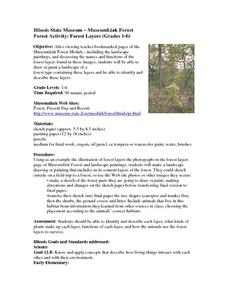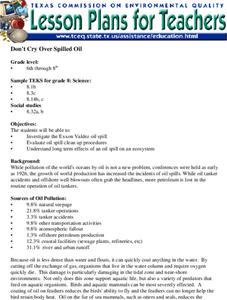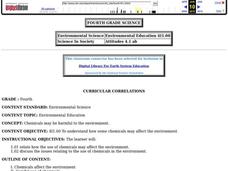Curated OER
It's Okay if You Sit on My Quilt Book
Students create a variety of quil blocks to create a unique pieced quilt top during every class. Based on the book It's Okay if You Sit on My Quilt. Students create a quilt block after each lecture.
Curated OER
Suitcase, Parfleche and 'Isaptakay
Third graders explore farfeche and how the Nez Perce people use natural materials to derive colors for their artwork. They explore traditional paints and dyes used by the Nez Perce and create their own parfleche 'isaptakay.
Curated OER
Adapted to Fire
Fourth graders explore forest species' adaptations to fire by participating in a scavenger hunt and mapping a burned forest. Students create maps and explore how indigenous species adapted to living with fire.
Curated OER
Apple Science
Sixth graders explore agriculture by viewing a fruits and vegetables video clip. In this apple characteristics lesson, 6th graders discuss how fruits and vegetables deteriorate after being exposed to oxygen and identify methods to defend...
Curated OER
The World Population Explosion
Pupils are introduced to some of the fundamental questions about the connections among population, resources and energy use, and environmental impacts. They explore population growth, interpret a line graph and calculate their own rate...
Curated OER
Tree Bagging
Students bag trees to determine the mass of the water given off in the evapotranspiration process.
Curated OER
Enzymes in Action: An Inquiry Approach to the Effects of Enzymes
Students experiment with enzymes as key components of chemical reactions in all living things through this series of lessons.
Curated OER
Conditions in And Connections To Indonesia
Eleventh graders research an animal and its habitat, the conditions of that habitat and how its connections to the rest of the world are affecting that habitat.
Curated OER
Why Do We Need Petroleum?
Students learn the many ways petroleum is used in our industrial society, and the advantages and disadvantages of its use. They explore what it would be like to live in a world without petroleum.
Curated OER
Earth Day
Third graders utilize technology to access, analyze, interpret and communicate information about Earth Day.
Curated OER
Home on the Biome
Fifth graders study six major biomes, graph temperature and rainfall, and present their findings to the class.
Curated OER
Color Your World with Changes --- the Camouflage Game
Seventh graders, after predicting dominant colors foud in their habitat or garden, visit heir area on a monthly basis. They search for colored toothpicks, then graph the results, determining the dominant color for the month.
Curated OER
The Siberian Arctic
Young scholars, in groups, research the topics: habitats of northwestern Siberia, reindeer, oil and natural gas, and other threatened regions of the Arctic. They answer specific research questions based on their topic. They use online...
Curated OER
Tackling Taxonomy
Students study physical characteristics of separate phyla and place them into similar groups. This lesson is part of a multi-segmented unit on the diversity of life. students develop a classification system by grouping animals into...
Curated OER
Forest Activity: Forest Layers (Grades 1-6)
Students use the Museumlink Forest Module to view landscape paintings and discuss the names and functions of the forest layers. They paint or draw a landscape of a forest with the layers and explain them.
Curated OER
Get the Dirt
Students investigate a variety of soil samples placed in cold water jars. Layers of soil are examined for the difference between organic matter and rock fragments.
Curated OER
Hibernating Hoopla
Students simulate hibernation with their stuffed animals. They predict the length of time of hibernation and type their math journal entries about sorting, graphing and draw pictures. They read bear hibernation stories.
Curated OER
Don't Cry Over Spilled Oil
Students study the Exxon Valdez Oil Spill while evaluating oil spill clean up activities. They discover the long term impact can have on an ecosystem by completing this experiment.
Curated OER
The Rock Cycle
Third graders, in groups, examine soil samples with magnifying glasses. They discuss the living and non-living things they find in their soild samples.
Curated OER
Environmental Science
Fourth graders examine how the use of chemicals may affect the environment and how their are many different political issues surrounding chemical usage and the environment. They research different newspapers and magazines about the issues.
Curated OER
Diversity and Adaptations of Organisms
Eighth graders discover how animals adapt to their surroundings. They identify physical traits and behaviors that are important to survival. They examine the results of an organism's failure to adapt.
Curated OER
PBS Kids Go Buster Buffalo Round-Up
Second graders visit Rapid City, South Dakota, and Jackson Hole, Wyoming in these two episodes of Buster. They examine the Lakota people in South Dakota to see what it means to persevere. They sing songs and study idioms. They brainstorm...
Curated OER
Classification
Young scholars work in groups of 4-6 for the experiment/activity part of this exercise. They classify ten animals using the information on the picture to group the animals. Students develop descriptions, explanations, predictions, and...

























